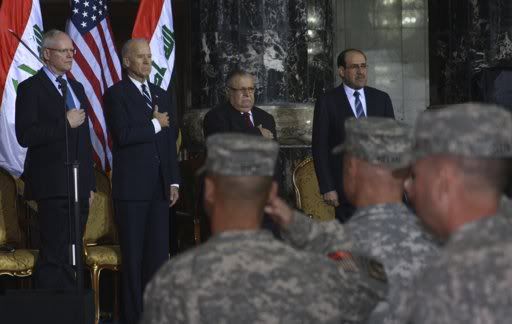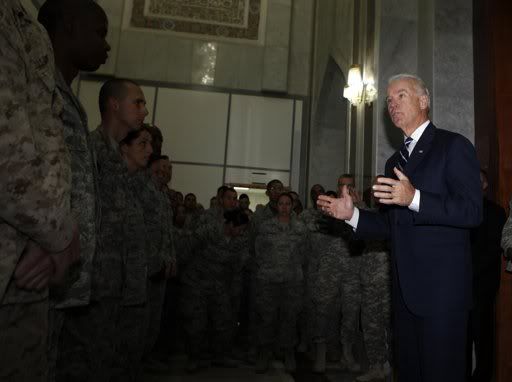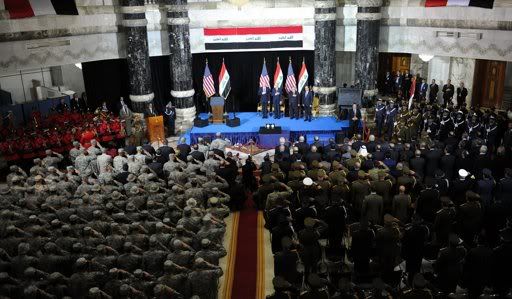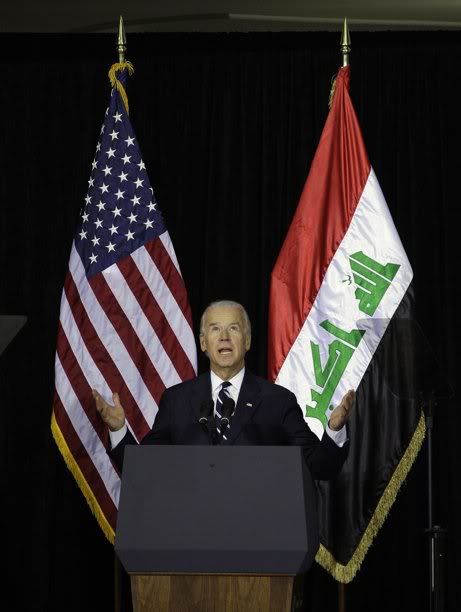The White House
Office of the Vice President
For Immediate Release
December 01, 2011
Remarks by Vice President Biden at Event to Honor U.S. and Iraqi Servicemembers
Aw-Fal Palace, Baghdad, Iraq
12:42 P.M. AST
Excerpt:
I wish everyone out there watching this on television could see the view from this stage where I stand right now. This palace, a grotesque monument to a dictator�s greed, is totally filled with American and Iraqi warriors who are bound together by a shared sacrifice in the service of both their countries -- an appropriate use of this palace today. Here in Iraq, you warriors became partners and friends, and now, undeniably, brothers-in-arms. All of you sitting before me today have laid the foundation for a long-term, strategic partnership between our nations and also for an Iraq that, against all odds, can serve as a source of stability not only for its people, but here in the region, and for years to come.
I think it�s fair to say almost no one thought that was possible a few years ago. So, on behalf of President Obama and the American people, let me say to both our armed forces today, thank you. Thank you for your heroic work that each one of you has done to bring about this moment. Because of you -- and it�s no exaggeration to say that -- because of you and the work those of you in uniform have done -- we are now able to end this war.
This journey began, as referenced by the Prime Minister and the President, more than eight-and-a-half years ago. March 19, 2003 was a very uncertain time in both our countries. As a result of our joint efforts, we toppled a murderous dictator, and after a grave struggle, gave Iraq both the time and the space for a society that has long suffered, long been stifled. We gave it the time and the space to reconstitute, and a political culture based on free elections and the rule of law to take hold.
Today we come together at another moment of transition. In America, and in Iraq, the tide of war is receding. And our relationship, borne on the battlefield and long defined by the imperative of security alone, is now giving way to a new, more normal partnership between sovereign nations seeking to build a future together.
President Obama and I came to office absolutely determined to bring this war to a responsible end, and to keep the promise we made to the American people and the people of Iraq that we would meet our commitments. Mr. Prime Minister, as you have seen, we are doing just that.
We kept our promise to remove all American troops from Iraq -- Iraqi cities. We kept our promise to end our combat mission last August and to reduce our forces in Iraq to 50,000. At the end of this month, we will keep our promise to remove our remaining troops from Iraq, which, when we came to office, numbered 140,000 American forces. Where I come from, where the President comes from, a promise made is a promise kept. And we are keeping our promise.
At every step along the way, as the Prime Minister pointed out, there were skeptics -- skeptics who said, don�t move too fast; what if the Iraqis aren�t ready to take on this responsibility? But the Iraq security forces proved to be more than ready. You met the challenge. Throughout the downturn of United States forces and coalition forces, you kept your people safe. And violence has remained at its lowest level since 2003 -- because of you.
So when President Obama and Prime Minister Maliki spoke this October 21st, they were in total agreement on the way forward. They agreed that the end of this phase of our relationship would be marked by the start of a new chapter -- a fresh start that the Iraqi people and the American people want, and so richly deserve.
I think the medal the Prime Minister is going to unveil later today has a perfect name: The Commitment Medal. Because it speaks to our nations' enduring commitment to one another, even as the nature of our mutual relationship evolves. It commemorates our cooperation under the security agreement, which expires at the end of this month. But it also reflects our mutual desire to embrace a new stage of our relationship, one that will be guided by the Strategic Framework Agreement -- again, referenced by my colleagues -- the Strategic Framework Agreement, which calls for broad cooperation across a wide range of areas of policy, including democratic institutions and diplomatic relations, trade and finance, energy, services, law enforcement and the judiciary, and culture and education -- and which, unlike our security agreement, does not expire.
http://www.whitehouse.gov/the-press-office/2011/12/01/remarks-vice-president-biden-event-honor-us-and-iraqi-servicemembers
U.S. Ambassador to Iraq James Jeffrey (L), U.S. Vice President Joe Biden (2nd L), Iraq's Prime Minister Nuri al-Maliki (R) and Iraq's President Jalal Talabani stand for the national anthem during one of several planned ceremonies to mark the end of American military presence in Iraq, in Baghdad December 1, 2011. The last 13,000 U.S. troops will pull out of Iraq by the end of the year. Violence in the country has dropped sharply since the heights of sectarian slaughter in 2006-2007, but at least 10 people were killed in a bombing just north of the capital Baghdad. REUTERS/Iraqi Government/Handout

U.S. Vice President Joe Biden (R) speaks with U.S. soldiers before they begin their journey home at Camp Victory in Baghdad, Iraq December 1, 2011. The last 13,000 U.S. troops will pull out of Iraq by the end of the year. Violence in the country has dropped sharply since the heights of sectarian slaughter in 2006-2007, but at least 10 people were killed in a bombing just north of the capital Baghdad. REUTERS/Khalid Mohammed/Pool

U.S. Ambassador to Iraq James Jeffrey (L), U.S. Vice President Joe Biden (2nd L), Iraq's Prime Minister Nuri al-Maliki (R) and Iraq's President Jalal Talabani stand for the national anthem during one of several planned ceremonies to mark the end of American military presence in Iraq, in Baghdad December 1, 2011. The last 13,000 U.S. troops will pull out of Iraq by the end of the year. Violence in the country has dropped sharply since the heights of sectarian slaughter in 2006-2007, but at least 10 people were killed in a bombing just north of the capital Baghdad. REUTERS/Iraqi Government/Handout

U.S. Vice President Joe Biden speaks during one of several planned ceremonies to mark the end of American military presence in Iraq, in Baghdad December 1, 2011. The last 13,000 U.S. troops will pull out of Iraq by the end of the year. Violence in the country has dropped sharply since the heights of sectarian slaughter in 2006-2007, but at least 10 people were killed in a bombing just north of the capital Baghdad. REUTERS/Khalid Mohammed/Pool